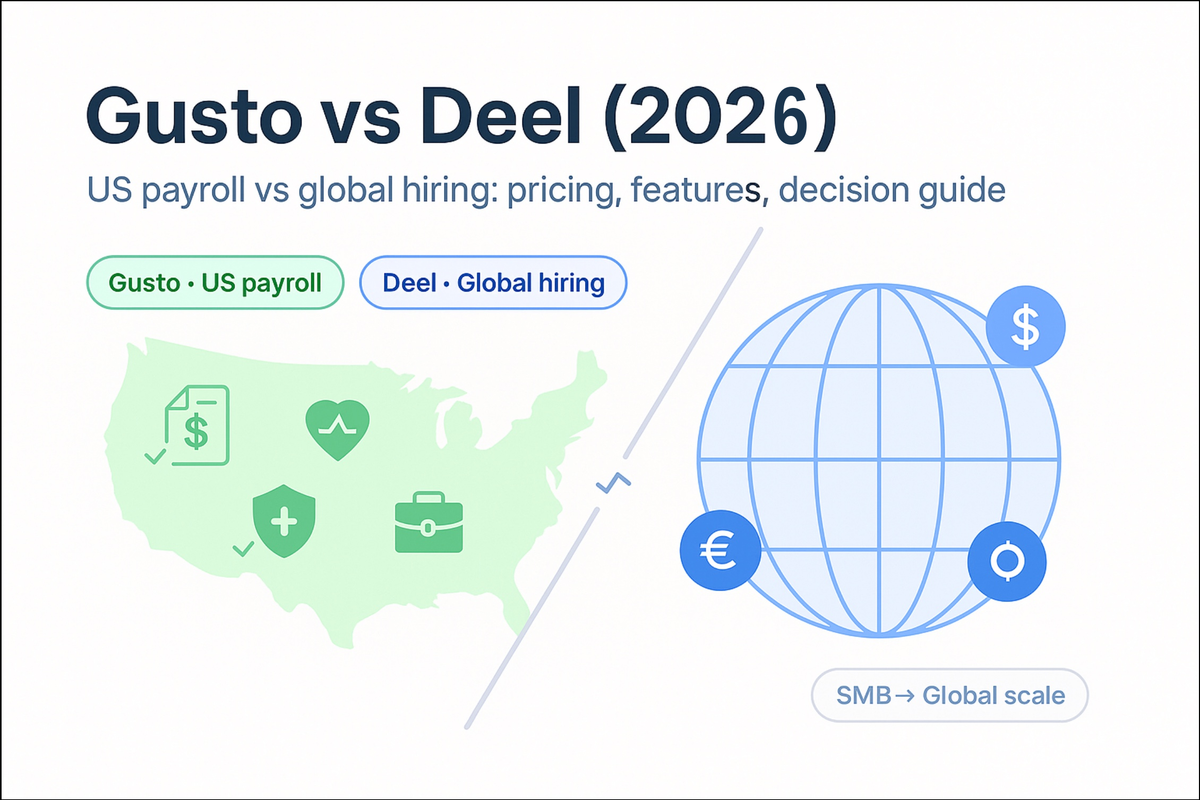Gusto vs. Deel (2026): Payroll, EOR, and Global Workforce Management Compared
Gusto handles US payroll and benefits. Deel handles global hiring and compliance. Here's how to decide based on where your team is today and where it's heading.

Short version: Gusto is the US payroll and benefits default for SMBs. Deel is the global employment infrastructure for remote-first companies that hire across many countries. Decide by geography first, then by features and price.
Table of Contents
- Executive Summary: The Geographic Imperative
- Platform Foundations and Architecture
- Pricing Deep Dive
- Feature Battleground: Compliance, HRIS, and Experience
- Technical Review: UX, Integrations, Support, and Security
- Two-Minute Decision and Comparison Table
- Real-World Scenarios
- Migration and Co-existence Strategy
- Limitations and Gotchas
- FAQ
- Implementation Steps and CTAs
- Sources
I. Executive Summary: The Geographic Imperative
Gusto and Deel are both market leaders, yet they solve different problems. Gusto masters US payroll, taxes, and benefits for small to mid-sized teams. Deel builds a single employment and payments fabric for global teams, with native Employer of Record coverage and strong contractor management in 150 plus countries.
Strategy in one line: If your team is mostly in the United States for the next 12 to 24 months, start on Gusto. If you already hire internationally or you plan to soon, start on Deel to avoid a costly switch later.
II. Platform Foundations and Architecture
2.1 Gusto: US payroll and people operations
- Full-service payroll with automatic federal, state, and local tax filings and year-end forms
- Deep US benefits administration and workers’ comp, plus financial wellness through the employee app
- HR basics, for example onboarding, document management, time tools, and performance reviews, sized for SMBs
- International contractor payouts available inside Gusto Global for lightweight cross-border needs
2.2 Deel: Global employment infrastructure
- Native EOR entities let you employ full-time workers without opening local subsidiaries
- Contractor management with localized contracts, invoicing, expenses, and multi-currency payouts
- Global HRIS layer with onboarding, time off, workflows, people analytics, and optional engagement tools
- Financial perks for global workers, for example early access to earned pay and crypto withdrawals for faster access to funds
2.3 What the architecture means for you
- Gusto is domestic-first. It is perfect for US operations and can pay international contractors, but for EOR it uses a partner. That is fine for modest global hiring, but less ideal for high-velocity expansion.
- Deel is global-first. Built to absorb country differences, currencies, and labor rules. It can feel heavier for US-only teams, yet it is future-proof if international hiring is on the roadmap.
III. Pricing Deep Dive
3.1 Gusto pricing for US teams
- Simple: about $49 base per month plus $6 per person, single-state payroll
- Plus: about $80 base per month plus $12 per person, multi-state payroll and time tracking
- Premium: custom pricing with advanced support
- Contractor-only: $35 base per month plus $6 per contractor
- International contractor payouts: no monthly per-contractor fee inside Gusto Global for light usage. Compliance remains on you.
3.2 Deel pricing for global teams
- Contractor Management: about $49 per contractor per month with localized contracts and checks
- Contractor of Record: from about $325 per contractor per month for added classification protection
- Employer of Record: from about $599 per employee per month with native entities
- Global payroll for your own entities: per-employee fee plus implementation once you incorporate locally
3.3 Interpreting the cost curves
Gusto’s low cost for international contractor payouts is attractive if you only pay a few freelancers. It does not include localized contracts and automated compliance, which means the risk sits with you. Deel is more expensive per contractor, yet that price includes localized contracts, compliance guardrails, multi-currency rails, and worker perks. Companies that scale internationally often accept Deel’s fee because it reduces legal risk and saves operations time.
IV. Feature Battleground: Compliance, HRIS, and Experience
4.1 Compliance and risk
- Gusto: automated US tax filings, filings for many jurisdictions, and alerts for common errors
- Deel: localized contracts, continuous legal updates, and native EOR coverage for employees across a wide footprint
- EOR model difference: Gusto’s EOR is provided through a partner, which adds a third party to the chain of updates and support. Deel’s EOR is native, which gives you a single point of accountability and a unified data flow.
4.2 HRIS capabilities
Gusto ships HR features that are sized for SMBs. Advanced features, for example time tools, often sit on higher tiers. Deel positions a global HRIS as the source of truth across countries, with onboarding, offboarding, approvals, time off, analytics, and optional engagement modules. If you need global people analytics and centralized processes, Deel’s HRIS layer runs deeper.
4.3 Employee and contractor financial perks
- Gusto: US employee wallet with early access, budgeting, and savings
- Deel: on-demand pay for EOR employees, contractor cash-flow tools, and crypto withdrawals through a mainstream partner for faster access to earnings
4.4 Country coverage, currencies, and payout options
- Deel supports 150 plus countries and 120 plus currencies. Payouts include bank transfers and popular digital methods. Options like crypto can reduce delays and fees for some contractors.
- Gusto’s international coverage focuses on contractor payouts. If you plan full-time employees in many countries, you will likely need an EOR provider like Deel.
V. Technical Review: UX, Integrations, Support, and Security
5.1 User experience
Gusto is widely regarded as the most intuitive US payroll tool, which helps founders or office managers who do not have payroll expertise. Deel’s interface is information-dense because it must show country rules, currencies, and EOR controls. Both aim to prevent mistakes and speed up processing.
5.2 Integrations and ecosystem
- Gusto: strong SMB stack coverage, including accounting systems such as QuickBooks and Xero, time tools, and benefits partners
- Deel: enterprise-grade integrations and APIs, for example NetSuite, SAP SuccessFactors, and Snowflake, which large teams use for centralized data flows
5.3 Support model
- Gusto: phone, chat, and email during business hours with after-hours email support
- Deel: 24/7 support across time zones, which is helpful once you operate worldwide
5.4 Security and data controls
Both vendors advertise modern security controls, for example encryption in transit and at rest, role-based access, audit logs, and SSO options. Ask your rep for current security reports and the latest compliance attestations before you finalize a contract, especially if your organization has strict vendor risk requirements.
VI. Two-Minute Decision and Comparison Table
Who should pick which
- Pick Gusto if you are US-centric, want transparent pricing, and need native US benefits with simple time and attendance.
- Pick Deel if you hire in many countries, want native EOR, and need localized contractor management with multi-currency payouts and 24/7 support.
Side-by-side comparison
| Category | Gusto (US focus) | Deel (Global focus) | Implication |
|---|---|---|---|
| Core strength | US payroll, taxes, and benefits | Global EOR and contractor management | Choose by geography and 12–24 month plan |
| US W-2 pricing | Simple $49 + $6 pp, Plus $80 + $12 pp, Premium custom | US payroll pricing usually by quote | Gusto is more transparent in the US |
| International contractors | No monthly per-contractor fee in Gusto Global | About $49 per contractor per month, includes localized contracts | Gusto is cheaper, Deel includes compliance automation |
| EOR | Partner-provided, from about $599 per employee per month | Native EOR, from about $599 per employee per month | Same price point, different architecture |
| Benefits | US health and retirement, workers’ comp | Global benefits via EOR and flexible worker perks | Gusto leads in US, Deel leads globally |
| Integrations | Broad SMB integrations | Enterprise integrations and APIs | Match your stack complexity |
| Support | Weekday business hours | 24/7 multi-channel support | Time zone coverage matters as you scale |
VII. Real-World Scenarios
Scenario A: US startup with a few offshore contractors
You have six US employees and two contractors in Canada and the Philippines. You need US benefits and simple payroll. Use Gusto for payroll and benefits. Pay the two contractors through Gusto Global only if the work is truly project-based and low control. If the contractor workload turns full-time-like or a strict jurisdiction is involved, move those workers to Deel’s Contractor of Record or EOR to reduce misclassification exposure.
Scenario B: Series A SaaS hiring in five countries this year
You plan to hire employees in Mexico, Germany, India, and the UK, plus contractors in three more countries. Choose Deel. Start those employees under EOR for speed. If you later open your own entity in a country, switch those workers to Global Payroll while keeping everything on the same platform.
Scenario C: US professional services firm with seasonal spikes
Most of your year is US-only. During peaks you bring in short-term experts in two countries. Gusto for your US baseline is perfect. For the overseas experts, either pay as international contractors through Gusto if risk is low, or spin up a short EOR engagement on Deel in a strict country. Keep it simple and document control and deliverables clearly.
Scenario D: Distributed, remote-first organization
Your culture is remote. You hire the best person wherever they live. This is Deel territory. Use EOR for employees, Contractor Management or CoR for freelancers, centralize policies in Deel HR, and standardize on multi-currency payments. Consider Gusto only if you decide to run a separate, US-only payroll for a legacy team.
VIII. Migration and Co-existence Strategy
- Audit your footprint: list headcount by country, type, pay cycle, benefits, and upcoming offers
- Pick a cut-over month: align with quarter end for financial clarity
- Pilot one country: if moving to Deel, start with a single EOR country to validate onboarding, payroll, and invoicing
- Run in parallel for one cycle: prevent surprises on net pay and deductions
- Lock policies: PTO, holidays, reimbursements, and data retention should be documented in the new HRIS
- Close the loop: de-provision old integrations, update accounting mappings, and archive reports for audits
IX. Limitations and Gotchas
- International contractor risk: paying contractors through a payroll tool does not classify them correctly. Control, schedule, equipment, and exclusivity drive the legal test. Use CoR or EOR when work becomes full-time-like.
- Country payroll calendars: holidays and bank cutoffs vary. Build a global payroll calendar and buffer approval dates.
- Entity vs EOR costs: EOR is fast, yet entity payroll can be cheaper long term once headcount is stable. Many companies start on EOR, then open entities and switch to global payroll later.
- Benefits expectations: US benefits do not map one to one to other countries. Local benefits are often statutory or customary. Plan total compensation country by country.
- Data locality: if you have strict data residency rules, ask about data centers, subprocessors, and export controls before you sign.
X. FAQ
Is Gusto cheaper than Deel?
For US W-2 payroll, Gusto is usually cheaper and more transparent. For global hiring, Deel has higher per-worker fees because you are paying for localized compliance and payments infrastructure.
Can I use both?
Yes. Many companies run Gusto for US payroll and Deel for global hiring. Accounting can ingest both through integrations.
When should I move a contractor to EOR employment?
Move when the work looks like employment: set hours, ongoing control, company equipment, or when the country has strict classification rules. Contractor of Record is an in-between option when you want added protection without switching to employment.
How fast can I hire internationally on Deel?
EOR hiring can often move from offer to active payroll in days, since you do not need to open an entity. Timelines vary by country and documents provided.
XI. Implementation Steps and CTAs
US-first teams
- Pick Simple or Plus depending on single-state or multi-state and whether you need time tools.
- Connect accounting, time, and benefits during onboarding.
- For a few international contractors, enable global payouts and document control and scope clearly.
Global-first or remote-everywhere teams
- Use Contractor Management for project work with low control. Consider Contractor of Record for added classification protection.
- Use EOR for full-time hires in countries where you do not own an entity. Migrate to Global Payroll when you incorporate locally.
- Enable payout options workers prefer, for example early wage access or crypto, to reduce delays and fees.
Sources
- Deel vs Gusto: Choosing the best payroll and HR solution - Joinsecret
- Deel vs. Gusto: A US Payroll Services Comparison
- Deel vs Gusto - Fondo
- Deel vs Gusto: In-Depth EOR Comparison for 2025 - Employ Borderless
- Deel: Employer of Record In-Depth Review
- Gusto vs Deel: Compare product features and pricing
- Global Payroll Services for Remote Teams | Gusto
- Payroll Software for Small Businesses | Gusto
- Gusto Help Center: Time tracking
- Gusto Pricing
- Gusto Help Center: App directory and integrations
- 7 Most User-Friendly Payroll Software Options in 2025
- 5 Benefits of EOR for Employee Experience - Deel
- HR Software to Manage Payroll, Compliance and More | Deel
- Gusto Pricing Tiers and Costs
- Deel vs. Gusto: Comparison and Expert Reviews for 2025
- App Store Integrations | Deel

